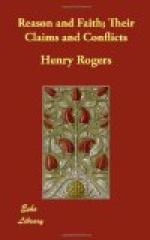____
If, therefore, we were to imitate the quaintness of the old divine, on whose dictum we have been commenting, we should rather compare Reason and Faith to the two trusty spies, ’faithful amongst the ‘faithless,’ who confirmed each other’s report of ’that good land which flowed with milk and honey,’ and to both of whom the promise of a rich inheritance there was given,—and, in due time, amply redeemed. Or, rather, if we might be permitted to pursue the same vein a little further, and throw over our shoulders for a moment that mantle of allegory which none but Bunyan could wear long and successfully, we should represent Reason and Faith as twin-born beings,—the one, in form and features the image of manly beauty,—the other, of feminine grace and gentleness; but to each of whom, alas! was allotted a sad privation. While the bright eyes of Reason are full of piercing and restless intelligence, his ear is closed to sound; and while Faith has an ear of exquisite delicacy, on her sightless orbs, as she lifts them towards heaven, the sunbeam plays in vain. Hand in hand the brother and sister, in all mutual love, pursue their way, through a world on which, like ours, day breaks and night falls alternate; by day the eyes of Reason are the guide of Faith, and by night the ear of Faith is the guide of Reason. As is wont with those who labour under these privations respectively Reason is apt to be eager, impetuous, impatient of that instruction which his infirmity will not permit him readily to apprehend; while Faith, gentle and docile, is ever willing to listen to the voice by which alone truth and wisdom can effectually reach her.
It has been shown by Butler in the fourth and fifth chapters (Part I.) of his great work, that the entire constitution and condition of man, viewed in relation to the present world alone, and consequently all the analogies derived from that fact in relation to a future world, suggest the conclusion that we are here the subjects of a probation discipline, or in a course of education for another state of existence. But it has not, perhaps, been sufficiently insisted on, that if in the actual course of that education, of which enlightened obedience to the ’law of virtue,’ as Butler expresses it, or, which is the same thing, to the dictates of supreme wisdom and goodness, is the great end, we give an unchecked ascendency to either Reason or Faith, we vitiate the whole process. The chief instrument by which that process is carried on is not Reason alone, or Faith alone, but their well-balanced and reciprocal interaction. It is a system of alternate checks and limitations, in which Reason does not supersede Faith, nor Faith encroach on Reason. But our meaning will be more evident when we have made one or two remarks on what are conceived to be their respective provinces. In the domain of Reason men generally include, 1st, what are called ‘intuitions,’ 2d, ‘necessary deductions’ from them; and 3d, deductions from their own direct




